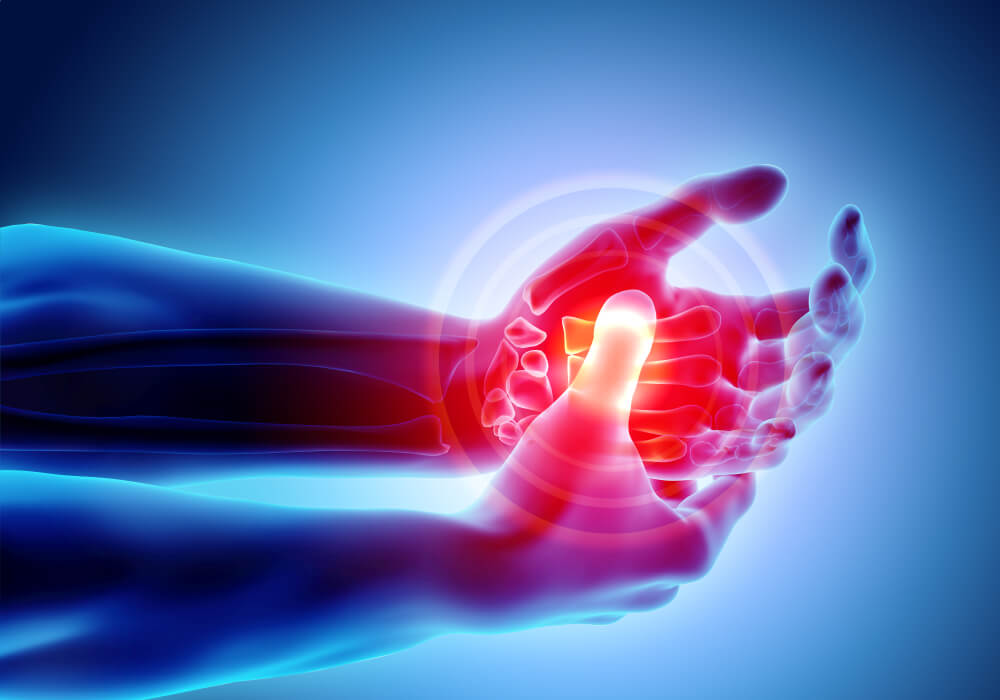
Chronic pain conditions can significantly affect your day-to-day life, impacting even the most simple, everyday tasks you were once able to do with ease. Nerve pain is no different.
So, what is nerve pain?
Nerve pain, or neuropathic pain, is a curious phenomenon that occurs when the nervous system faces damage, disease, or irritation.
It’s like a glitch in the system, causing problems with the signals travelling along the nerves. Nerve damage can not only distort or alter existing messages, but also generate new pain signals or block the usual ones from occurring normally.
Types of nerve pain
There are a few different types of nerve pain, including peripheral, central and autonomic.
Peripheral nerve pain, known as peripheral neuropathy, strikes the peripheral nerves and nervous system, impacting the body’s extremities.
In contrast, central nerve pain targets the central nervous system, with symptoms commonly experienced in the face, arms, or legs.
Autonomic neuropathy affects the involuntary nerves connected to muscles and vital organs such as the heart, sweat glands, bowels, and bladder.
It’s crucial to note that all forms of nerve pain, including nerve pain in the spine, can linger for months if left unaddressed, ultimately disrupting a person’s quality of life. If you’re grappling with nerve pain, seek advice from a healthcare professional to explore the most effective treatment options.
Common causes of nerve pain
So, what causes nerve pain? There are many possible causes of nerve pain, most of which are associated with compression, traction, distortion or irritation of neural tissue from postural faults, disease, repetitive movements, loss of a limb, or trauma.
Some health conditions that cause nerve pain include:
- Diabetes
- Cancer, and some cancer treatments including chemotherapy
- Multiple sclerosis, and other neurological conditions
- Neurodegenerative conditions, such as Parkinson’s disease
- Shingles
- Stroke
- HIV
- Autoimmune conditions
Common symptoms of nerve pain
Some of the common symptoms of nerve pain are:
- Numbness or tingling sensation
- Shooting, burning or stabbing pain
- Spontaneous pain—pain that comes without stimulation
- Pins and needles
- Weakness
- Symptoms that are worse in cold weather
If you are suffering from any of these symptoms, it is important to speak to a healthcare professional to determine the underlying cause and work out the best treatment options for your unique condition.
Diagnosis of nerve pain
You can receive a diagnosis from a physiotherapist. They can determine the degree of irritation of the nerve in question by assessing the symptoms you present with. You may be referred for further tests, such as an x-ray, MRI, CT scan or nerve conduction study. This may be used to confirm the diagnosis and to assess the structural severity of your condition.
Treatment of nerve pain
How can nerve pain treatment make a difference? While it’s true that nerve pain may not vanish entirely, a variety of treatments exist that can offer substantial relief and improve your quality of life.
Physiotherapy
Physiotherapy shines as a valuable treatment option for nerve pain. Tailored to your specific needs, your personalised plan will give consideration to the cause and ongoing contributing factors to the persistence of your condition.
Initially, nerve physiotherapy focuses on enhancing pain management, reducing inflammation and using treatment that optimise the environment of the irritated nerve tissue. As treatment progresses, it aims to restore muscle strength, joint mobility, proper posture, a relaxed state of positioning and flexibility.
Employing an array of techniques, your Como physiotherapist will guide you in regaining normal range of motion and muscle tension. Treatments may include dry needling, soft tissue work, neural tissue mobilisation, and targeted exercises. Advice may include discussions around relaxation, sleep health and general exercise to optimise recovery.
Ultimately, nerve physiotherapy strives to restore function, strength, and control while preventing recurrence—enabling you to resume daily activities pain-free.

Medication
While over-the-counter pain relief medications can be helpful in managing mild to moderate nerve pain, they may not provide adequate relief for severe or chronic nerve pain. It’s crucial to follow the recommended dosage and consult with a healthcare professional before starting any new medication.
Additionally, keep in mind that some over-the-counter pain relief options may have potential side effects, such as gastrointestinal problems or liver damage.
Ultimately, it’s best to seek advice from a medical professional who can help you develop an individualised treatment plan that offers the most effective relief for your nerve pain.
Specific treatment options
Dry needling can be an effective treatment for nerve pain. It involves the insertion of thin needles into trigger points in the muscle tissue, causing a twitch response that can help to release tension and improve blood flow.
Dry needling can help to alleviate nerve pain by targeting the muscles and soft tissues that may be contributing to your discomfort. Additionally, it can promote the release of endorphins, which are the body’s natural pain-relieving chemicals.
Stress management techniques such as yoga, meditation or talk therapy may help with nerve pain. The symptoms of many types of chronic pain are often worsened by stress or depression, so these therapies may help to relax your body and ease the intensity of your pain.

Lifestyle changes that may help manage your nerve pain
Making some important lifestyle adjustments is a good way to help prevent, or relieve the symptoms of, chronic nerve pain.
Here are some changes you should consider making:
- Get regular exercise—a physiotherapist can support you through appropriate exercises and provide you with some to do at home
- Eat well
- Avoid excess alcohol
- Quit smoking
- Avoid repetitive movements
- Don’t remain sedentary for long periods of time
Find out how physiotherapy can help
At Integrity Physio, our team of experienced physiotherapists can assist in determining the contributing factors for your nerve pain and create an appropriate treatment plan to help support you through treatment.
Our physiotherapists are experienced in providing effective treatment for many forms of nerve pain, including back nerve pain. Contact Integrity Physio Como today to find out how physiotherapy can help manage your pain.



